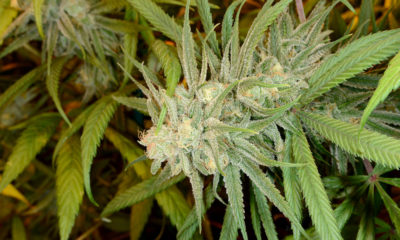
Industry Events
Govt. Has Patent For What’s In UFC Fighter’s CBD Pen
The National Institutes of Health’s Patent No. 6,630,507 is related to CBD.
When UFC fighter Nate Diaz took puff after puff from his Tru CBD cannabis oil pen on Saturday night following his main event bout with Conor McGregor, the cannabis-embracing athlete was doing more than consuming a compound known to help protect his brain and body from the trauma he just endured. He was using a compound for which the U.S. government’s Department of Health and Human Services has issued a patent.
Though Diaz and McGregor fought in Las Vegas, where medical marijuana is legal and available to patients carrying physicians’ recommendations from other states — including Diaz’s native California — the UFC does not allow athletes in competition to use cannabis, as per direction from the U.S. Anti-Doping Agency.
That didn’t matter to Diaz the second after the fifth round of his fight with McGregor ended. The competition was over, so he was free to smoke — and chose to puff the nonpsychoactive vape pen instead.
“It helps with healing process, inflammation, and stuff like that,” Diaz said, at a reporter’s prompt. “So you want to get these for before and after the fight, make your life a better place. CBD… CBD oil, if you don’t know what that is.”
That’s exactly what the National Institutes of Health’s Patent No. 6,630,507 is related to.
“Cannabinoids have been found to have antioxidant properties,” the patent reads in part.
“This new found property makes cannabinoids useful in the treatment and prophylaxis of wide variety of oxidation associated diseases, such as ischemic, age-related, inflammatory and autoimmune diseases. The cannabinoids are found to have particular application as neuroprotectants, for example in limiting neurological damage following ischemic insults, such as stroke and trauma, or in the treatment of neurodegenerative diseases, such as Alzheimer’s disease, Parkinson’s disease and HIV dementia. Nonpsychoactive cannabinoids, such as cannabidoil, are particularly advantageous to use because they avoid toxicity that is encountered with psychoactive cannabinoids at high doses useful in the method of the present invention.”
Diaz was sure to rep the product on his Instagram feed in the days leading up to the fight. And it appears he might be able to use it even while training.
The World Anti-Doping Agency classifies cannabis as a banned substance, though athletes at the Olympics this summer saw their threshold for a positive test increase tenfold, from 15 nanograms of THC per milliliter of blood to 150.
CBD, or cannabidiol, is one of the more than one hundred cannabinoids found in the cannabis plant. Acceptance and awareness of CBD has skyrocketed since Sanjay Gupta, CNN’s chief medical correspondent, highlighted the compound’s palliative effects on a one-hour special.
But let’s not forget THC. Gupta hasn’t. While THC gets some of the negative attention for creating cannabis’s psychoactive effects, THC and CBD appear to need each other to work properly — the “entourage effect” — and it was THC, not CBD, which was shown to shrink tumors in lab rats, according to a study conducted in Spain.
CBD is of particular interest to athletes competing in sports where head trauma is routine — think UFC and the National Football League. Diaz received (and gave) numerous shots to the head during his fight with McGregor, and concussions are routine for many football players.
Numerous former NFL players have come out in strong support of cannabis for past and current athletes, as CBD’s value as a neuroprotectant — one of its values cited in the U.S. patent — is of particular interest to players suffering from post-concussion syndrome, including the terrible degenerative condition known as CTE.
Hall of Fame pro football players like Junior Seau, who committed suicide, and Super Bowl-winner Mike Webster both suffered from CTE, which causes Alzheimer’s-like afflictions including confusion, dementia, aggression, and depression.
So far, just one company has sought permission from the NIH to study cannabis under the patent, according to The Cannabist: New York-based Kannalife, Inc., which is studying cannabis’s potential for aiding symptoms of CTE.
Government-acknowledged medical potential: That’s what Diaz is vaping.
Do you believe UFC fighters should be able to use marijuana?






















